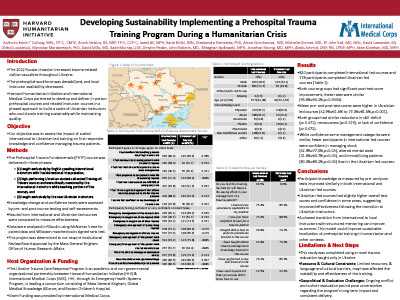ABSTRACTS
Developing Sustainability Implementing a Prehospital Trauma Training Program During a Humanitarian CrisisAuthor: Kevin Collopy, Brock Jenkins, Javed Ali, Oleskandra Demestka, Alona Goncharova, Michelle Gonnet, Katie Murray, Myroslav Mardarevych, Dmytro Pedan, Alexis Schmid, and Sean Kivlehan | | Associate Authors:
Introduction: The 2022 Russian invasion increased trauma-related civilian casualties throughout Ukraine. The prehospital workforce was destabilized, and the availability of local instructors decreased. Harvard Humanitarian Initiative and International Medical Corps partnered to develop and deliver in-person prehospital courses and related instructor courses in a phased approach to build a cadre of Ukrainian instructors who could scale training sustainably while maintaining quality. Objective: To assess the impact of scaled international to Ukrainian-led training on first responder knowledge and confidence managing trauma patients. Methods: The Prehospital Trauma Fundamentals (PHTF) course was delivered in three phases: (1) English-speaking international instructors with live bidirectional interpretation, (2) high-performing Ukrainian students who attended training-of-trainers courses and were directly mentored by international instructors while teaching portions of the courses, and (3) exclusive instruction by the new Ukrainian instructors. Knowledge change and confidence levels were assessed via pre- and postcourse testing and self-assessments. Results from international and Ukrainian-led courses were compared to measure effectiveness. Data were analyzed in RStudio using McNemar’s test for paired data and Wilcoxon matched-pairs signed-rank test. This project was determined to not require Institutional Review Board approval by the Mass General Brigham Office of Human Research Affairs. Results: A total of 820 participants completed international-led courses and 178 participants completed Ukrainian-led courses. Both course groups had significant posttest score improvement (93.6% vs. 94.2%, p = .9434). Mean pre- and posttest scores were higher in Ukrainian-led courses (52.9% vs. 61.6% to 77.0% vs. 81.6%, p < .001). Both groups had similar reductions in skill deficit (p = .471), nervousness (p = .519), and lack of confidence (p = .472). While confidence values in some management categories were similar, fewer participants in international-led courses were confident in managing shock (62.9% vs. 77.0%, p < .05), altered mental state (51.6% vs. 64.7%, p < 0.05), and immobilizing patients (80.0% vs. 89.2%, p < .05) than in the Ukrainian-led courses. Conclusion: Participant knowledge as measured by pre- and posttests improved similarly in both international and Ukrainian-led courses. Ukrainian-led courses had slightly higher overall test scores and confidence in some areas, suggesting improved effectiveness following the transition to Ukrainian instructors. A phased transition from international to local instructors with structured mentoring can improve outcomes. This model could improve sustainable localization of prehospital training in humanitarian and other contexts.
|

